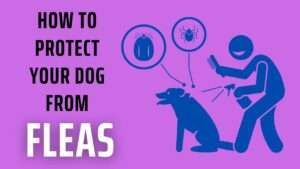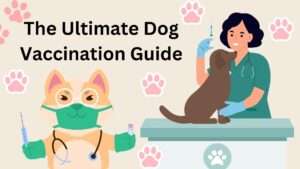Every dog owner wants their furry friend to live a happy and healthy life. One crucial aspect of maintaining a dog’s health is ensuring they receive proper vaccinations. Among these, the rabies vaccine stands out as one of the most important. But what exactly is rabies, why is the vaccination necessary, and what do dog owners need to know? Let’s delve into this comprehensive guide to understand everything about rabies vaccination for dogs.
Contents Overview
Understanding Rabies
Rabies is a serious infection of the nervous system that is caused by a virus. It is usually transmitted by a bite from an infected animal. The incubation period of the disease can vary from 1 week to 1 year, though it is typically 2-3 months. Once symptoms appear, rabies is almost always fatal, making prevention crucial.
- Transmission: Rabies spreads through the saliva of infected animals, usually through bites.
- Symptoms: Initial symptoms may include fever, headache, and weakness, progressing to neurological symptoms like confusion, paralysis, and aggression.
- Prevalence: While rabies is preventable, it remains a significant public health concern, especially in regions with high stray dog populations.
Importance of Rabies Vaccination
Rabies vaccination is of paramount importance in safeguarding both animal and human health. Let’s explore the significance of rabies vaccination in detail:
- Prevention of Rabies Transmission:
- Primary Protection: Vaccination is the most effective way to prevent rabies in dogs and other animals. By vaccinating pets, particularly dogs, we can reduce the risk of rabies transmission to humans through animal bites.
- Breaking the Chain: Vaccinating domestic animals disrupts the cycle of rabies transmission, as vaccinated animals are less likely to become infected and transmit the virus to other animals or humans.
- Legal Requirement:
- Mandatory Vaccination: In many regions, rabies vaccination for dogs is a legal requirement. Authorities mandate vaccination to protect public health and prevent outbreaks of rabies.
- Compliance: Adhering to vaccination requirements ensures compliance with local laws and regulations, avoiding potential fines or penalties for non-compliance.
- Protection for Dogs:
- Health and Well-being: Rabies vaccination protects dogs from contracting a deadly viral disease. It is a fundamental aspect of responsible pet ownership and ensures the health and well-being of canine companions.
- Long-term Health: Vaccinated dogs develop immunity against rabies, providing long-term protection against the virus. Regular booster shots help maintain immunity throughout the dog’s life.
- Public Health Impact:
- Reduction of Human Cases: Vaccinating dogs reduces the incidence of rabies in animals, thereby lowering the risk of rabies transmission to humans. This is especially important in regions where rabies is endemic and stray dog populations are high.
- Economic Benefits: Preventing human rabies cases through vaccination programs saves healthcare costs associated with post-exposure prophylaxis and treatment. It also reduces the economic burden of rabies outbreaks on communities.
- International Travel Requirements:
- Traveling with Pets: Rabies vaccination is often a mandatory requirement for international travel with pets. Many countries have strict regulations regarding the vaccination status of imported dogs to prevent the introduction of rabies into rabies-free regions.
- Documentation: Pet owners must provide proof of rabies vaccination, typically in the form of a vaccination certificate or pet passport, when traveling internationally with their dogs.
- Community Health Initiatives:
- Vaccination Programs: Government agencies, veterinary organizations, and animal welfare groups often conduct rabies vaccination campaigns in high-risk areas. These programs aim to vaccinate as many dogs as possible to create herd immunity and eliminate rabies transmission.
- Accessibility: Some organizations offer low-cost or free rabies vaccination clinics to ensure accessibility for pet owners, particularly in underserved communities where vaccination may be cost-prohibitive.
Rabies vaccination is not only a means of protecting individual animals but also a critical public health measure with far-reaching benefits. By prioritizing vaccination efforts, communities can work towards the goal of rabies elimination and create safer environments for both humans and animals alike.
When to Vaccinate
Determining the appropriate timing for rabies vaccination in dogs is crucial for ensuring optimal protection against the disease. Let’s explore the vaccination schedule and key considerations:
- Puppy Vaccination:
- Initial Vaccination: Puppies typically receive their first rabies vaccine between 12 to 16 weeks of age, depending on local regulations and veterinary recommendations.
- Immune System Development: Vaccinating puppies at the appropriate age ensures that their immune systems are mature enough to mount an effective response to the vaccine.
- Health Status: Puppies should be in good health before receiving the rabies vaccine. Veterinary professionals may recommend delaying vaccination in puppies with underlying health issues.
- Booster Shots:
- Maintenance of Immunity: After the initial vaccination, dogs require regular booster shots to maintain immunity against rabies.
- Frequency: Booster shots are typically administered annually, although some vaccines may provide protection for longer durations, allowing for extended intervals between boosters.
- Compliance: Adhering to the recommended vaccination schedule ensures continuous protection against rabies and compliance with legal requirements.
- Legal Requirements:
- Regulatory Guidelines: Rabies vaccination requirements for dogs vary by jurisdiction. It is essential for pet owners to familiarize themselves with local laws and regulations regarding vaccination.
- Proof of Vaccination: Many regions require pet owners to provide proof of rabies vaccination when licensing their dogs or traveling with them. Failure to comply with vaccination requirements may result in fines or other penalties.
- Risk Assessment:
- Local Rabies Risk: The timing of rabies vaccination may be influenced by the prevalence of rabies in the local area. In regions where rabies is endemic or there is a high incidence of wildlife rabies, vaccination at a younger age may be recommended.
- Exposure Risk: Dogs that are frequently outdoors or in contact with wildlife may be at higher risk of rabies exposure and may benefit from earlier vaccination.
- Veterinarian Guidance:
- Individualized Recommendations: Veterinarians play a crucial role in determining the appropriate timing of rabies vaccination for each dog. They consider factors such as the dog’s age, health status, lifestyle, and local rabies risk when making vaccination recommendations.
- Customized Schedule: In some cases, veterinarians may recommend a customized vaccination schedule based on the specific needs and circumstances of the dog.
- International Travel Requirements:
- Pre-Travel Vaccination: Dogs traveling internationally may be required to be vaccinated against rabies before entry into certain countries.
- Timing Considerations: Pet owners should plan ahead and ensure that their dogs are vaccinated within the timeframe specified by the destination country’s regulations. Additionally, documentation of vaccination may be required for travel.
Adhering to the recommended vaccination schedule and seeking guidance from veterinary professionals are essential for ensuring that dogs receive timely and effective protection against rabies. By vaccinating dogs according to appropriate guidelines, pet owners can help prevent the spread of rabies and protect the health of their canine companions.
Administering the Vaccine
Administering the rabies vaccine to dogs requires careful attention to ensure its effectiveness and safety. Let’s explore the process of administering the vaccine in detail:
- Veterinary Administration:
- Professional Supervision: Rabies vaccines should be administered by licensed veterinarians or under their direct supervision. Veterinarians have the expertise to properly handle and administer vaccines and can address any potential complications or adverse reactions.
- Clinical Setting: Vaccination is typically performed in a clinical setting, such as a veterinary clinic or hospital, where proper equipment and protocols are in place to ensure safety and efficacy.
- Types of Vaccines:
- Traditional Injections: The most common method of administering the rabies vaccine is through subcutaneous injection. The vaccine is injected under the skin, usually in the region of the neck or shoulder.
- Oral Vaccines: In some cases, particularly in wildlife vaccination programs, oral rabies vaccines may be used. These vaccines are administered orally, either through baited bait stations or directly to target animals.
- Vaccine Handling and Storage:
- Cold Chain Management: Rabies vaccines, like other biological products, must be stored and transported under specific temperature conditions to maintain their potency. Improper storage can compromise vaccine effectiveness.
- Vaccine Integrity: Before administration, veterinary professionals carefully inspect the vaccine vial to ensure that it has not been compromised or expired. Only vaccines that meet quality standards should be used.
- Pre-Vaccination Examination:
- Health Assessment: Before administering the rabies vaccine, veterinarians typically conduct a pre-vaccination examination to assess the dog’s health status. This includes evaluating vital signs, overall condition, and any pre-existing medical conditions.
- Risk Assessment: Veterinarians may also inquire about the dog’s lifestyle and potential rabies exposure risks to tailor vaccination recommendations accordingly.
- Post-Vaccination Monitoring:
- Observation Period: After receiving the rabies vaccine, dogs are often observed for a brief period to monitor for any immediate adverse reactions. Veterinary professionals are trained to recognize and respond to signs of adverse events promptly.
- Owner Education: Pet owners are usually provided with instructions on how to monitor their dogs for any delayed reactions or signs of vaccine-related complications. It is essential to follow up with the veterinarian if any concerns arise.
- Documentation and Compliance:
- Vaccination Records: Veterinarians maintain detailed vaccination records for each dog, documenting the type of vaccine administered, the date of vaccination, and other relevant information.
- Compliance with Regulations: Pet owners should ensure that their dogs receive rabies vaccinations in compliance with local laws and regulations. Proof of vaccination may be required for licensing, travel, and other purposes.
Administering the rabies vaccine to dogs is a critical aspect of responsible pet ownership and public health. By entrusting vaccination to qualified veterinary professionals and adhering to proper procedures, pet owners can contribute to rabies prevention efforts and protect the health and well-being of their canine companions.
Side Effects and Risks
Understanding the potential side effects and risks associated with rabies vaccination is essential for pet owners and veterinarians. While rabies vaccines are generally safe, like any medical intervention, they can carry some risks. Let’s explore these aspects in detail:
- Common Side Effects:
- Mild Reactions: Most dogs experience minimal or no side effects after receiving the rabies vaccine. However, some may exhibit mild reactions, including:
- Soreness or swelling at the injection site
- Mild fever
- Lethargy or decreased appetite
- Transient behavioral changes
- Rare Risks and Adverse Reactions:
- Allergic Reactions: In rare cases, dogs may experience allergic reactions to components of the vaccine, such as adjuvants or preservatives. Signs of an allergic reaction may include:
- Facial swelling
- Hives or itching
- Difficulty breathing
- Collapse or shock
- Neurological Issues: Although uncommon, some dogs may develop neurological symptoms following vaccination, such as:
- Seizures
- Ataxia (loss of coordination)
- Tremors or muscle weakness
- Anaphylaxis: Anaphylactic reactions, characterized by severe and potentially life-threatening symptoms, are extremely rare but can occur shortly after vaccination. Immediate veterinary intervention is necessary in such cases.
- Breed and Individual Variability:
- Breed Predispositions: Certain dog breeds may be more prone to vaccine-related adverse events than others. For example, breeds with a genetic predisposition to immune-mediated diseases may have an increased risk of vaccine reactions.
- Individual Sensitivity: Each dog is unique, and individual variability in immune response and tolerance to vaccines may influence the likelihood and severity of side effects.
- Management and Treatment:
- Prevention: Veterinarians may take preventive measures to reduce the risk of vaccine reactions, such as administering antihistamines or corticosteroids prior to vaccination in dogs with a history of allergic reactions.
- Prompt Recognition: Pet owners should be educated on how to recognize signs of vaccine reactions and instructed to seek immediate veterinary care if any concerning symptoms develop.
- Treatment: Treatment of vaccine reactions may involve supportive care, such as intravenous fluids, antipyretics for fever, or medications to alleviate allergic symptoms. Severe reactions may require intensive care and monitoring.
- Reporting Adverse Events:
- Veterinary Reporting: Veterinarians are encouraged to report suspected vaccine-related adverse events to the appropriate regulatory authorities or vaccine manufacturers. This helps monitor vaccine safety and identify potential concerns.
- Pet Owner Communication: Pet owners should communicate any vaccine-related concerns or adverse reactions to their veterinarians, who can provide guidance and support.
- Risk-Benefit Assessment:
- Balancing Risks and Benefits: While vaccine-associated risks exist, they must be weighed against the significant benefits of rabies vaccination in preventing a fatal disease. The overall risk of rabies far outweighs the potential risks associated with vaccination.
By understanding the potential side effects and risks of rabies vaccination, pet owners and veterinarians can make informed decisions regarding vaccination protocols and ensure the health and safety of dogs. Open communication, careful monitoring, and prompt veterinary intervention are key components of responsible vaccine administration.
Cost Considerations
Cost considerations are an important aspect of rabies vaccination for dogs in the USA, impacting access to preventive healthcare for pets and compliance with legal requirements. Let’s explore the various factors influencing the cost of rabies vaccination:
- Veterinary Fees:
- Consultation Fees: Veterinary clinics typically charge a consultation fee for the examination and assessment of the dog’s health before vaccination.
- Vaccination Fee: The cost of the rabies vaccine itself varies depending on the type of vaccine used, the brand, and the dosage.
- Administration Fee: Veterinarians may charge an additional fee for administering the vaccine, reflecting the time and expertise required for proper vaccination.
- Vaccine Type and Brand:
- Traditional Injectable Vaccines: Traditional rabies vaccines administered via subcutaneous injection are commonly used in veterinary practice. The cost may vary based on the specific brand and formulation of the vaccine.
- Newer Oral Vaccines: Oral rabies vaccines, typically used in wildlife vaccination programs, may have different cost considerations. These vaccines are distributed in baited bait stations or directly to target animals and may require specialized handling and administration.
- Frequency of Vaccination:
- Initial Vaccination: The cost of the initial rabies vaccination for puppies is part of the overall expense of puppy care, including other core vaccines and preventive healthcare measures.
- Booster Shots: Dogs require regular booster shots to maintain immunity against rabies. The frequency of booster vaccination, typically annually, adds to the overall cost of rabies prevention over the dog’s lifetime.
- Location and Clinic Practices:
- Regional Variability: The cost of rabies vaccination may vary depending on the geographic location and local market conditions. Veterinary fees, including vaccination costs, may be higher in urban areas or regions with a higher cost of living.
- Clinic Policies: Veterinary clinics may have different pricing structures and policies regarding vaccination fees. Some clinics offer package deals or discounted vaccination clinics, while others may charge standard rates for individual services.
- Financial Assistance Programs:
- Nonprofit Organizations: Some nonprofit organizations, animal welfare groups, or government agencies may offer low-cost or free rabies vaccination clinics to promote responsible pet ownership and public health.
- Community Programs: Local health departments or animal control agencies may organize vaccination drives or subsidized vaccination programs to increase access to rabies prevention services in underserved communities.
- Travel Requirements:
- Cost of Compliance: If traveling with a dog domestically or internationally, pet owners may incur additional costs related to rabies vaccination to comply with travel requirements. This may include obtaining a rabies vaccination certificate or documentation of vaccination history.
Overall, the cost of rabies vaccination for dogs in the USA depends on various factors, including veterinary fees, vaccine type and brand, frequency of vaccination, location, and available financial assistance programs. Pet owners should consult with their veterinarians to understand the costs involved and ensure that their dogs receive timely and appropriate rabies vaccination to protect their health and comply with legal requirements.
Travel Requirements
Travel requirements for dogs, including rabies vaccination regulations, vary depending on the destination country or state. Understanding these requirements is essential for pet owners planning to travel with their dogs. Here’s a detailed overview of travel requirements related to rabies vaccination:
- Domestic Travel:
- Interstate Travel: When traveling between states within the USA, there are generally no federal requirements for rabies vaccination. However, some states may have their own regulations regarding rabies vaccination and health certificates for dogs entering or moving within their borders.
- State-Specific Regulations: Pet owners should research the specific requirements of both the departure and destination states to ensure compliance with rabies vaccination and other health-related regulations.
- International Travel:
- Import Regulations: Traveling internationally with a dog often requires compliance with the import regulations of the destination country. Rabies vaccination is a common requirement for entry into many countries.
- Pre-Travel Preparation: Pet owners planning international travel should begin the preparation process well in advance, as some countries have specific timelines for rabies vaccination and other health-related procedures.
- Rabies Vaccination Certificate: Most countries require a valid rabies vaccination certificate issued by a licensed veterinarian. The certificate should include details such as the dog’s description, microchip or tattoo identification, vaccination information (including vaccine type, manufacturer, and date of administration), and the veterinarian’s signature and contact information.
- Timelines and Waiting Periods:
- Pre-Travel Vaccination: Many countries require dogs to be vaccinated against rabies at least 21 days before travel. This waiting period allows time for the vaccine to provide immunity and ensures that the dog is not incubating rabies at the time of travel.
- Additional Requirements: Some countries may have additional requirements, such as specific types of rabies vaccines, additional health certifications, or quarantine periods upon arrival.
- Microchipping and Identification:
- Microchip Requirement: Microchipping is often a mandatory requirement for international travel with dogs. The microchip serves as permanent identification and facilitates the verification of vaccination records.
- Compatibility: Pet owners should ensure that the microchip meets international standards and is compatible with scanners used in the destination country.
- Documentation and Health Certificates:
- Health Examination: Dogs may require a health examination by a licensed veterinarian before travel to ensure they are fit for travel.
- Health Certificate: In addition to the rabies vaccination certificate, some countries may require a general health certificate issued within a specific timeframe before travel. The health certificate confirms the dog’s overall health status and compliance with import requirements.
- Quarantine Regulations:
- Quarantine Periods: In some cases, dogs may be subject to quarantine upon arrival in the destination country, particularly if there are concerns about rabies or other infectious diseases. The duration of quarantine varies depending on the country’s regulations and the dog’s vaccination and health status.
Pet owners should thoroughly research the travel requirements of their destination country well in advance of their trip and consult with their veterinarian to ensure compliance with rabies vaccination and other health-related regulations. Failure to meet travel requirements can result in delays, denial of entry, or quarantine upon arrival, underscoring the importance of proper preparation and documentation for international travel with dogs.
Bottom Line
Rabies vaccination is a critical aspect of responsible dog ownership, not only for the well-being of your canine companion but also for public health. By understanding the importance of vaccination, adhering to the recommended schedule, and ensuring proper administration, dog owners can protect their pets and contribute to rabies prevention efforts. Remember, a small step like getting your dog vaccinated can make a big difference in safeguarding both animal and human health.



































+ There are no comments
Add yours